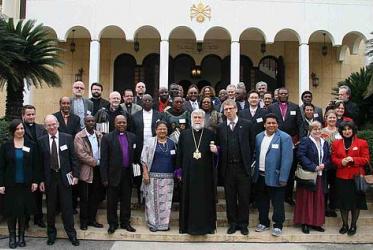Nazeli Kandakarjian, a member of the Armenian Apostolic Church (Holy See of Cilicia) in Lebanon, is serving as a young adult steward at these central committee meetings. She arrived five days late for the training programme due to a series of visa difficulties, ultimately receiving her visa just a few hours before her rescheduled flight on 11 Feb. "It was like in the movies", she said of the last-minute rush. When she finally arrived in Geneva, though--her first trip outside the Middle East--she was warmly welcomed by the other stewards. They were eager to learn about her, and she enjoyed hearing their stories, as well. She said the group bonded quickly and has worked well together. "It's like being in the center of the globe", said Kandakarjian, who was born in Kuwait. "I have people from all over the world telling me their experiences. It couldn't be any better than this. I'm so happy to be here". A friend who attended the WCC Assembly in Porto Alegre in 2006 encouraged her to apply for the stewards programme. She did, because she liked the idea of actually working at the meetings and not just being an observer. Now Kandakarjian is carrying that same message to others. "I would like to encourage everyone to be in this kind of experience", she said, expressing an appreciation for the ecumenical work she was able to witness. "It's a once-in-a-lifetime experience. It's great". All of the stewards were recognised at the conclusion of the meetings Wednesday with a round of applause and the moderator's thanks, and each received the gift of a WCC watch.
20 February 2008




!["All Iraqis are trying to leave," Clara - a young woman working for the Greek Orthodox Patriarchate in Damascus and a refugee herself - told the WCC delegation. "Since one year the United Nations tell us that they will find a solution [for Iraqi refugees in the region], but nothing happens." "All Iraqis are trying to leave," Clara - a young woman working for the Greek Orthodox Patriarchate in Damascus and a refugee herself - told the WCC delegation. "Since one year the United Nations tell us that they will find a solution [for Iraqi refugees in the region], but nothing happens."](/sites/default/files/styles/teaser/public/newsItem/wjV59XHs.jpeg?itok=YIkp9xNl)



